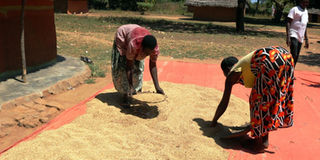Teso farmers stranded with sorghum harvest

Preserving. Women in Apuwai Village in Mukura Sub-county, Ngora District, spread their epuripur sorghum on a tarpaulin do dry yesterday. PHOTYO BY DAVID ODUUT.
What you need to know:
- No market. The beer companies have not purchased the raw material for the last two years.
- The Epuripur sorghum is a key ingredient in the making of beers Senator and Eagle Larger produced by EABL and NBL, respectively.
Farmers in Teso Sub-region are stuck with tonnes of white sorghum commonly known as epuripur following an alleged withdrawal by beer companies from buying the produce.
Farmers in the sub-region have for almost two decades relied on beer companies, including Nile breweries Ltd (NBL) and East African Breweries Ltd (EABL), as sole buyers of the produce.
The Epuripur sorghum is a key ingredient in the making of beers Senator and Eagle Larger produced by EABL and NBL, respectively.
According to farmers, the agents contracted by the beer companies have not bought any sorghum in the last two years, something that has left many farmers with reduced income amid other challenges like poor storage facilities for the crop.
Mr James Opio, a farmer in Omolokonyo village in Kumi District, told Daily Monitor on Wednesday that he has been growning this type of sorghum since 2011, which has been helping him support his family but was shocked when the agents suddenly stopped buying the crop in 2018.
“Without any explanation, buyers suddenly told us that they would not buy the crop in 2018. But they again gave us more seeds early last year, with a promise to buy the crop but we are told that there is still no money to buy our sorghum,” he said.
Mr Joseph Ogwang, another farmer from Apuwai Village, Kaler Parish, Mukura Sub-county in Ngora District, said in 2018, buyers charged them Shs3,500 per kilo of the new variety of epuripur sorghum but have since failed to return to purchase the sorghum produced.
Mr Ogwang, who has more than three tonnes of the grain stashed in sacks in his grass-thatched house, said many farmers are helplessly watching as their produce rots away due to lack of market.
“Some of us are thinking of going to court to seek redress because this sorghum cannot be eaten like any other. It is specifically consumed by the beer companies that encouraged us to grow it, so it’s like they have duped us,” Mr Ogwang said.
Mr Robert Odea Apedel, the chairperson of South Division in Kumi Municipality, said it is disturbing that Nile breweries has stopped buying epuripur sorghum and yet they clearly engaged farmers into large scale production of the crop.
“I want to make both a political and economic appeal through agents that they should buy the crop because farmers need to earn from their toil,” Mr Apedel said.
He said as a local leader, he witnessed Nile Breweries distribute seeds to farmers last year but was saddened that they have since left the farmers stranded.
The various agents working on behalf of beer companies in Teso sub-region declined to comment on the matter.
However, Mr Peter Onapito Ekomoloit, the NBL director of legal and corporate affairs, said the demand for beer has dropped, which has affected their production.
“The sorghum we bought last time is still lying in our stores and production has dropped due to declining beer demands,” Mr Ekomoloit said.
He added that farmers have also defied regulations made by the beer company by producing more than they are told.
“But on Monday, we also met with the agents to see the way forward,” Mr Ekomoloit told Daily Monitor in a telephone interview on Wednesday.
Epuripur sorghum
Epuripur sorghum was developed by the National Agricultural Research Organisation (Naro) and dispensed to farmers mostly in the low lying regions of Teso Sub-region. In the recent years, the sorghum has been a money-minting venture for many farmers in the area after it was found to posses excellent brewing qualities.




